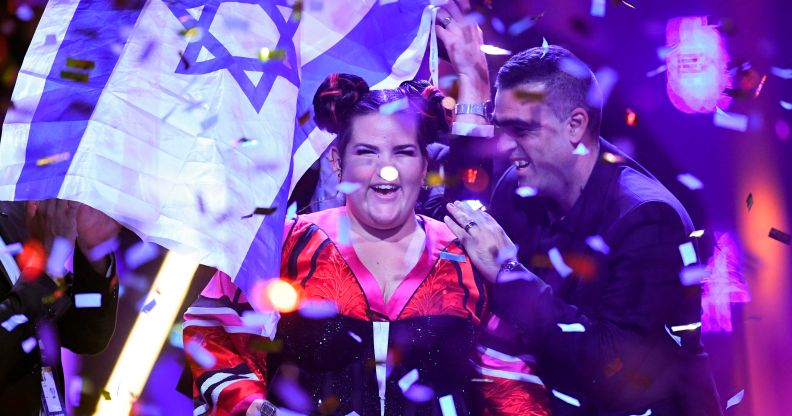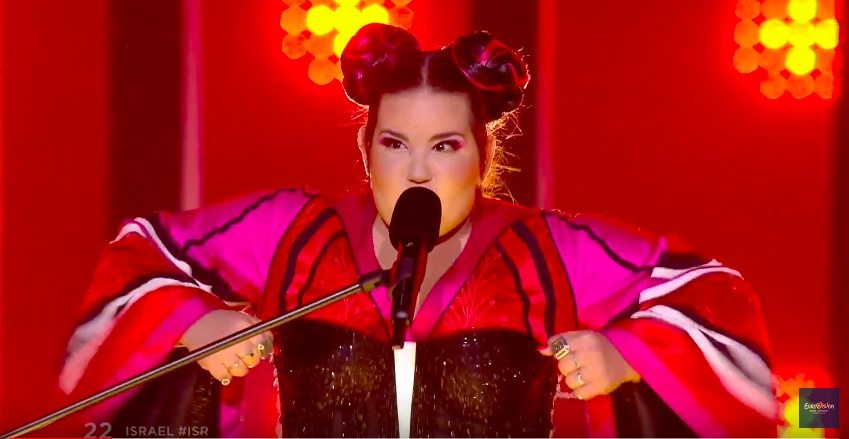Eurovision winner sparks confusion with ‘next time Jerusalem’ comment

Israel’s singer Netta Barzilai aka Netta performs after winning the final of the 63rd edition of the Eurovision Song Contest 2018 at the Altice Arena in Lisbon, on May 12, 2018. (Photo by Francisco LEONG / AFP) (Photo credit should read FRANCISCO LEONG/AFP/Getty Images)
Israel winner Netta Barzilai has caused confusion by appearing to suggest Eurovision would take place in Jerusalem next year, after winning the contest with an eye-grabbing performance.
Israel won the 2018 Eurovision Song Contest on Saturday with a timely song about female empowerment in the era of #MeToo and #TimesUp – just before Tel Aviv Pride.
But in her victory speech, Netta seemed to state that the winning country will host next year’s Eurovision in Jerusalem next year, not Tel Aviv.
Following her win, Netta shouted: “Thank you for much for choosing difference, thank you so much for accepting differences between us. Thank you for celebrating diversity, thank you. I love my country.”
She added: “Next time Jerusalem.”
This was followed by a tweet from Israel’s prime minister Benjamin Netanyahu, who said: “Next year in Jerusalem!”

(netanyahu/Twitter)
But the comment may not have been literal.
The phrase “L’Shana Haba’ah B’Yerushalayim” is spoken and sung during major Jewish holy days Pesach and Yom Kippur.
It was historically used in the hope that Jews would one day be able to return to Israel.
Nowadays, it can simply be used as a celebratory phrase, rather than for its literal meaning.
Next year’s host city hasn’t been officially confirmed by Eurovision yet.
A Eurovision spokesperson told PinkNews: “There is nothing confirmed yet on the host city, we will announce this in due course.”
The Israeli singer, simply known as Netta, gave a show-stopping performance of “Toy,” complete with chicken noises and an electronic looper.
She was a hot favourite to win the accolade, with her official video for the song racking up more 25 million views on YouTube before this evening’s event had even started.
The topical track includes lyrics like: “Wonder Woman, don’t you ever forget / You’re divine and he’s about to regret / He’s a bwoka-mhm-bwokbwokbwok-mhm boy,” and: “I’m not your toy / You stupid boy.”
The 25-year old singer has already picked up an OUTtv award after winning a vote among the contest’s LGBT fanbase.
Some, however, were critical of the winner, accusing Netta of cultural appropriation with her hair styling and by wearing Asian-looking clothing. One Twitter user wrote: “So how come no one’s calling Israel out on their cultural appropriation?”
Netta has previously said about her Eurovision song: “I think the song is #MeToo, but it’s an empowerment song for everybody, and everybody can find themselves in it.

Netta’s chicken dance (YouTube/EBU)
“For me, when I sing it, I think about bullying and people who try to bring you down because they’re afraid of you. It’s an empowerment song for everybody.”
Israel claimed the award with 529 points, knocking Cyprus into second place.
Britain’s SuRie – the bookies’ favourite to finish last – did better than expected, finishing 23.
However, her rendition of “Storm” was disrupted when a man managed to get onto the stage and grabbed the microphone from the singer, reportedly shouting “for the Nazis of the UK media, we demand freedom,” which temporarily halted her performance.
SuRie was given the chance to perform again, but turned down the offer.
Last time there was a rage invasion, the act got to perform again at the end of the night. Assume that’ll happen again tonight. Well done to SuRie for holding it together. #Eurovision #GBR pic.twitter.com/BIEaWHvtCk
— Mark Savage (@mrdiscopop) May 12, 2018
Elsewhere, Ireland’s Ryan O’Shaughnessy performed “Together,” a moving ballad about a failed same-sex relationship.
His performance included two male dancers re-enacting a same-sex love story. Watch the video here.
Chinese broadcaster Mango TV was dropped from the Eurovision Song Contest’s organising body the EBU after censoring parts of O’Shaughnessy’s performance in the semi-final on Tuesday night.
In other highlights, the BBC threw Australia’s Jessica Mauboy some serious shade, likening her to drag star Miss Vanjie.
Meanwhile, bonafide queer icon Saara Aalto represented her home country Finland with the up-tempo song “Monsters.”
The track’s official video is a glorious celebration of identity, featuring genderfluid performers and drag artists – and a very queer reenactment of The Last Supper.
But the on-stage performance appears took a different route, featuring dancers in militaristic uniforms gathered around a giant Illuminati-esque pyramid and Aalto trapped to a rotating wheel.
Aalto previously told PinkNews the song is about “living life as you want, finding your strength, being brave as who you are and not being afraid to show it.”
She added: “I am very proud to be lesbian and I feel very much like I am lesbian, totally.”

